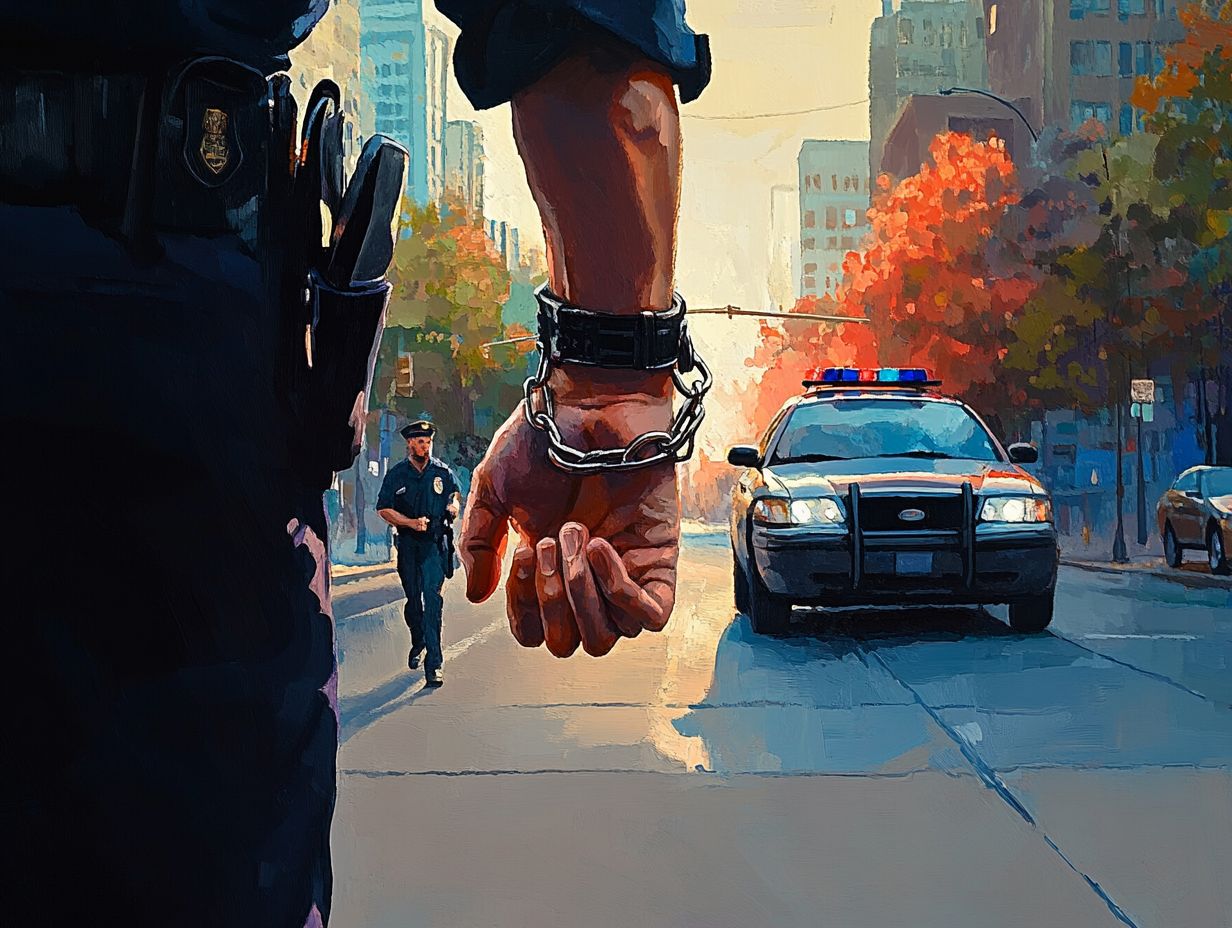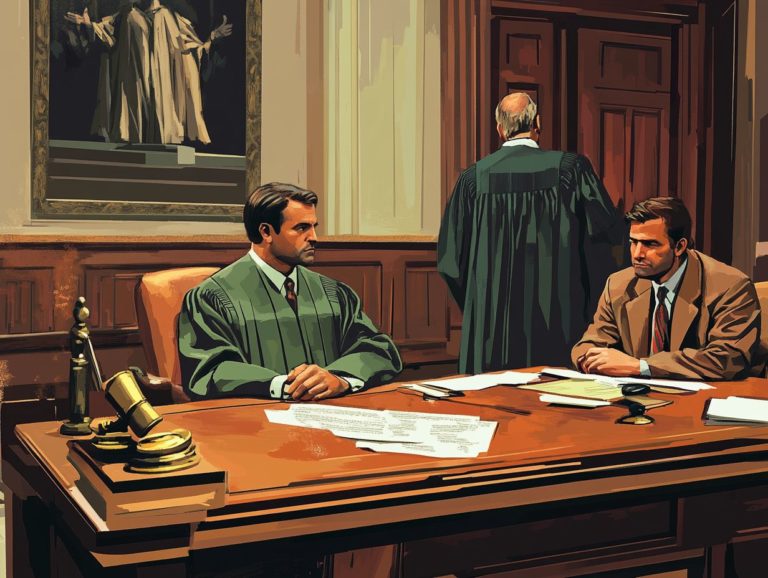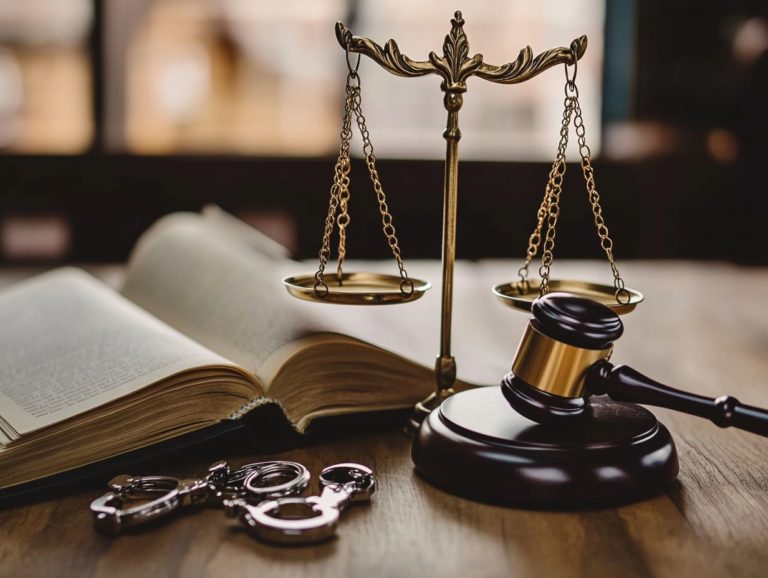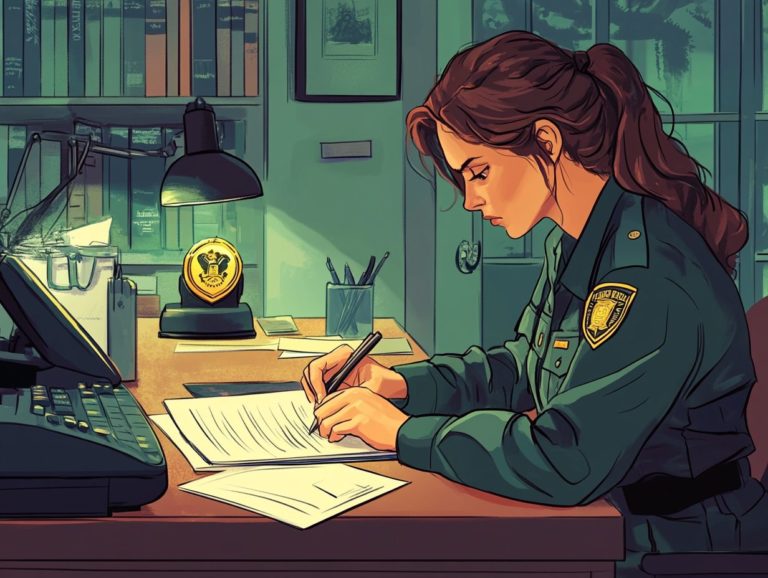What Should You Do if Arrested?
Facing an arrest can be an overwhelming experience, shrouded in uncertainty and anxiety.
Understanding the arrest process is vital for anyone in your position. Knowing your rights during an arrest and interrogation, as well as determining your next steps like contacting a lawyer and posting bail can make a significant difference. This guide delves into each crucial aspect to ensure you re well-informed.
It also outlines how to prepare for court and explores the various options available for resolving your case. Equip yourself with the knowledge you need to navigate this challenging period with confidence.
Contents
Key Takeaways:
Know your rights during an arrest and interrogation to protect yourself.
Take immediate action by contacting a lawyer and posting bail after an arrest.
Prepare for court by gathering evidence and understanding the charges against you.
Consider all options, such as plea bargains or going to trial, to resolve your case.
Understanding the Arrest Process
The arrest process is an important part of law enforcement, in which police officers take an individual into custody based on legal grounds, such as an arrest warrant or reasonable suspicion of criminal activity.
The law clearly outlines this procedure and encompasses specific rights that you have during an arrest. Law enforcement must follow proper protocols to ensure that justice is upheld and your rights are safeguarded, especially concerning any evidence that may be collected during the arrest.
What Happens During an Arrest?
During an arrest, police officers must adhere to legal protocols, which may include presenting an arrest warrant or explaining why they think you may have committed a crime.
Once law enforcement identifies a suspect, they typically approach with caution, ensuring that every action is documented and justified. Officers may assess your immigration status to determine if further action is warranted under immigration law.
Holding a valid search warrant is essential, as it gives officers the power to conduct a thorough search of the premises where the arrest occurs, enabling them to gather critical evidence related to the alleged crime.
This evidence collection is far from a mere formality; it lays the groundwork for any potential prosecution and helps guarantee that the legal rights of all parties involved are respected.
Know Your Rights
Knowing your rights in a run-in with the law is crucial and can change everything! Understanding your constitutional right to remain silent and your right to consult with a lawyer upon request can significantly impact the outcome of a criminal case and serve as a vital safeguard against potential police misconduct.
Rights During an Arrest
During an arrest, it’s crucial for you to exercise your constitutional right to remain silent. This simple act can significantly safeguard your personal safety and influence the legal proceedings that may unfold, especially when police officers are involved.
You also have the right to request an arrest warrant. This ensures that law enforcement has a valid reason to detain you. It s equally important to understand the reasons behind your detention, as this information can play a pivotal role in your defense. Knowing your rights gives you power during this stressful encounter and can make a substantial difference in protecting your legal interests.
Being informed about these rights not only aids you in navigating the situation more effectively but also underscores the significance of due process.
Rights During Interrogation

Under interrogation, you have the right to consult a lawyer before answering any questions. This right is crucial for safeguarding against police misconduct and ensuring that any statements you make aren t used against you in a criminal case.
This right gives you the power to receive legal guidance, which is crucial for understanding the potential repercussions of your answers.
Police conduct during interrogations must follow established protocols. Any coercive or intimidating tactics could render any confessions obtained questionable and inadmissible in court.
You can revoke your consent to speak at any time. Recognizing the boundaries of your rights can significantly influence the outcome of legal proceedings and strengthen your defense.
Steps to Take After an Arrest
After an arrest, act quickly! Contact a lawyer immediately. Your first move should be to reach out for legal help.
This professional can offer invaluable legal advice and expertly guide you through posting bail or navigating your criminal case with confidence.
Contacting a Lawyer
Contacting a lawyer promptly after an arrest is essential. They can provide vital legal advice that may significantly influence the trajectory of your criminal case.
The legal landscape can feel overwhelming, especially if you re unfamiliar with criminal proceedings. An experienced attorney will help you gain a clearer understanding of your rights and possible defenses.
Having skilled representation is crucial during pivotal moments such as arraignments and bail hearings. A lawyer can advocate for your fair treatment, working to mitigate the repercussions of your arrest.
Early legal intervention not only clarifies your options but also gives you the power to make informed decisions throughout the process. Don’t face this alone reach out to a lawyer now!
Posting Bail
Posting bail after an arrest is a vital step that secures your release while awaiting trial. It often requires legal advice to understand the details of your arrest and the specific conditions set by the court.
Understanding the bail posting process can greatly influence your legal journey. It impacts both your freedom and the overall legal proceedings you ll encounter.
This process involves several steps, starting with determining the bail amount and arranging for payment, typically through a bail bondsman, a person who helps you pay bail when it s too high.
Legal counsel is essential in clarifying the implications of the arrest warrant. They help you comprehend your rights, responsibilities, and potential consequences. With the right guidance, you can better manage your situation and make informed decisions.
Preparing for Court
Getting ready for court? It s vital to your case! It involves gathering evidence and identifying essential witnesses while understanding the charges you face.
This groundwork is crucial for constructing a strong defense in your criminal case.
Gathering Evidence and Witnesses

Gathering evidence and identifying witnesses are essential steps in crafting a robust defense for your criminal case. They provide the critical context and support that can sway the trial’s outcome.
These processes not only strengthen your narrative but also lay the groundwork for the arguments you’ll present in court. Techniques like interviews, forensic analysis, and surveillance can reveal vital details.
Witness testimonies are particularly significant, offering firsthand accounts that lend credibility and depth to your defense. Seeking legal counsel is crucial in this journey. A savvy attorney can help you compile the necessary documentation and ensure that your evidence meets admissibility standards.
This strategic approach ultimately boosts your chances of securing a favorable verdict.
Understanding the Charges Against You
Facing legal charges? It’s time to take control and understand what lies ahead! Understanding the charges against you is crucial for preparing for court. It helps you craft a defense strategy and seek the right legal advice from professionals who can clarify the implications of the actions taken by police during your arrest.
Grasping the nuances of the legal allegations gives you the power to understand the complicated legal system and helps identify potential defenses that could alleviate your circumstances. A thorough awareness of the possible consequences whether financial penalties, incarceration, or long-term repercussions on your record highlights the importance of having legal representation.
By engaging with an attorney who specializes in criminal law, you gain invaluable insights that help you comprehend your rights and responsibilities while developing a tailored strategy for your specific case. This approach not only brings clarity but also ensures you are well-prepared for the legal proceedings ahead.
Options for Resolving Your Case
When you encounter legal challenges, it’s essential to explore the various options available for resolving your criminal case. This may involve considering plea bargains or deciding to go to trial. Each path carries its own implications, making it crucial to seek comprehensive legal advice to navigate these choices effectively.
Plea Bargains
Plea bargains are deals where you can admit guilt to lesser charges for a lighter sentence. It’s crucial to seek legal advice to ensure that the terms are favorable and just. These arrangements can significantly ease the burden of prolonged courtroom proceedings, providing a quicker resolution for everyone involved.
While the advantages may seem enticing, it’s important to recognize the inherent risks that come with them. By accepting a plea, you might be surrendering your right to a trial, which could lead to consequences that outweigh the benefits of a seemingly advantageous deal.
Understanding these agreements is crucial for your case. This highlights the necessity of consulting with an experienced attorney who can adeptly navigate the complexities of the legal system and advocate for the best possible outcome for you.
Going to Trial
Going to trial is a monumental decision in a criminal case, demanding thorough preparation and a deep understanding of the evidence that police officers may bring forward. This process typically starts with a meticulous examination of the charges you face, along with the compilation and analysis of all relevant evidence that could sway the outcome.
It s crucial for you to collaborate closely with your legal counsel. They can offer invaluable insights into the courtroom’s procedural intricacies and help you craft a formidable defense strategy. A skilled attorney will not only pinpoint weaknesses in the prosecution s evidence but will also guide you in presenting a compelling case.
Gathering pertinent documentation, witness testimonies, and expert analyses is essential in shaping an effective defense, ultimately influencing the jury s perception of your situation.
Frequently Asked Questions

What Should You Do if Arrested?
If you are arrested, the most important thing to do is remain calm and cooperative with the law enforcement officers. Do not resist arrest or attempt to argue with the officers.
What rights do I have if I am arrested?
If you are arrested, you have the right to remain silent and the right to an attorney. It is important to exercise these rights and avoid self-incrimination.
Should I hire a lawyer if I am arrested?
Yes, it is highly recommended to hire a lawyer if you are arrested. A lawyer can help protect your rights and provide legal representation to ensure the best possible outcome for your case.
What happens if I cannot afford a lawyer?
If you cannot afford a lawyer, you have the right to have a court-appointed attorney provided for you. This is often referred to as a public defender.
What should I do during the booking process?
During the booking process, you should provide basic information such as your name and address. It is important to remain calm and avoid making any statements that could be used against you later.
Need help? Contact a lawyer today to understand your options better!
Can I be released on bail if I am arrested?
Getting released on bail can be a huge relief after an arrest!
Typically, you pay a set amount to the court to promise you’ll show up for your court dates.







